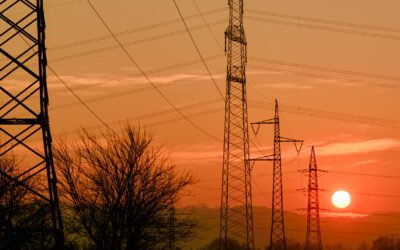- According to the International Energy Agency, the transportation sector accounts for 24% of direct CO2 emissions from fuel combustion.
- In 2021, Biden signed an executive order to electrify the 645,000 vehicles in the federal fleet.
- Several EV manufacturing startups are establishing facilities in the U.S.
Power Technology Research includes, trucks, buses, Light Commercial Vehicles (LCVs), agricultural vehicles and forklifts in their Commercial and Off Highway Vehicle (COHV) category. Out of these, trucks, LCVs and buses are leading in electrification, especially in the U.S.
In this article, we will focus on the electrification trends in the U.S. as the federal government and private sector corporations shift from ICE powered vehicles to electric LCVs.
The U.S. Electrification Trends
Recently, President Biden signed an executive order to devise a strategy to electrify close to 645,000 vehicles in the federal fleet. These include around 200,000 passenger vehicles, 78500 heavy duty trucks, 47,370 vans, 850 ambulances and 3 limousines. Annually, federal vehicles are driven 4.5 billion miles while consuming 400 million gallons of gasoline and releasing greenhouse gases in excess of 7 billion pounds.
The Paris Agreement (ratified in 2016) is essentially a non-binding international treaty on climate change. Each country determines their own Nationally Determined Contributions (NDC) and reports their progress. Every 5 years there is a global stock take to measure the progress. The goal is to keep global warming to well below 2°C, as compared to pre-industrial levels, with efforts to reach to 1.5°C. Organizations have taken up climate goals in addition to the Paris Agreement which are as follows:
- The Under2 Coalition brings together 260 governments and offers ways to achieve these climate goals through policy actions and initiatives. EV100 is one of the initiatives and brings companies together “committed to switching their fleets to electric vehicles and installing EV charging infrastructure for employees and customers by 2030.”
- The Climate Pledge calls on organizations to be net zero carbon across their businesses by 2040. 115 companies have signed the pledge to implement decarbonization strategies, use credible offsets and to report regularly on their greenhouse emissions.
Although the U.S. is one of the signatories of the Paris Agreement, it has not signed the Under2 Coalition, although many states and cities in the U.S. have. Since 24% of direct CO2 emissions come from fuel combustion, according to the International Energy Agency, for the U.S. to achieve its climate goals it must move towards the electrification of transport sector,
Private sector Initiatives
The following companies and agencies are either members of EV100 or have signed the Climate Pledge or have announced independent initiatives to convert their fleets to electric power:
Amazon – co-founder of the Climate Pledge – Amazon announced that half of all its shipments would be net-zero carbon by 2030. The entire company (including transportation) will be net-zero carbon by 2040. (LCVs)
UPS – company initiative – UPS has committed to purchasing 10,000 electric vehicles from Arrival. Information on the Arrival website said the vehicles “will be rolled out over 2020-2024.” (LCVs)
DHL – founding member of EV100- is preparing to roll out a new fleet of electric delivery vans that will serve the U.S. market. The fleet of 63 NGEN-1000 electric delivery cargo vans are produced by Workhorse Group. While aiming to reduce all logistic-related emissions to zero by 2050, DHL has set four interim milestones by 2025 as part of their environmental protection program called GoGreen. This includes operating 70% of its own first- and last-mile services with clean pickup and delivery solutions, such as bicycles and electric vehicles. (Trucks, LCVs)
Pacific Gas & Electric Company – EV100 – As part of PG&E’s broader commitment to accelerating electric vehicle adoption and supporting California’s climate goals, PG&E has made the following commitment to electrify 100% of their light-duty fleet, 10% of the medium-duty fleet, and 5% of the heavy-duty fleet by 2030. (Trucks, LCVs)
The Port Authority of New York & New Jersey – EV100 – is a public agency that has set the objective of making at least 50% of their LCV fleet electrified by 2025, and 100% by 2030.
As seen in the companies mentioned above will account for a larger share of the EV LCV market. Figure 2 . shows projected shares of electric commercial vehicles in US fleets by 2025.

Figure 1: Projected number of electric commercial vehicles in US fleets by 2025.
Source: Power Technology Research

Source: Power Technology Research
Some established car companies are coming out with their electric offerings but there are also a number of startups which are establishing electric vehicle manufacturing facilities in the US:
- Arrival UK is a British electric van and truck startup which has recently announced its plans to build new plant in North Carolina whose production will largely meet order of 10,000 electric vehicles from UPS.
- Rivian, with a manufacturing center in Normal, Illinois, received an order for 100,000 all-electric delivery vans from Amazon. Rivian began testing their delivery trucks earlier this year in select cities and the first 10,000 LCVs will be delivered to Amazon by the end of 2022.
- Workhouse Group, from Cincinnati, Ohio, received orders from DHL as well as Pritchard and Ryder Systems. They have a planned production of over 1,800 vehicles this year.
- Some of the conventional car companies with electric vehicle offerings include Ford which retrofitted one of their older plants to produce the E-transit van and has over 20,000 reservations. The vehicle is being tested now.
Conclusion
In order to combat the ever-increasing aspects of climate change, governments and companies are actively taking steps to shift towards cleaner, renewable technologies. The United States is one of the major economies in the world that is on the forefront of moving in that direction especially with the policies enacted by the government this year. The United States is setting precedent and can become a leader in vehicle electrification.
In the meantime, no significant growth is observed in the electrification of trucks, mostly due to technical hurdles, but growth is expected in the electrification of commercial delivery vehicles in US. The global transportation network has one of the largest carbon footprints, and this very transition may eventually help lead the world to a better, cleaner tomorrow.
Service Overview
More about our Commercial & Off-Highway Vehicles Market Research
Recent Insights
US Elections: Consequences of a Second Trump Presidency for Energy Sector
The US is making strides to move away from fossil fuels and eventually decarbonize the energy sector. The White House aims to achieve 80% renewable energy generation by 2030 and 100% carbon-free electricity by 2035. On the other hand, for electric vehicles, it has set...
Sustainability Across Sectors: Highlights from GreenTech Festival 2024
Recently, I had the privilege to attend and present at the Greentech Festival, an excellent event in the realm of sustainability. This influential gathering left a profound impact, and I am delighted to share a comprehensive analysis of my experiences. The Greentech...
US and EU Strategies in Smart Buildings
Download Service Overview The EU and USA aim to decarbonize their building sectors to meet emission reduction targets. Initiatives like the Home Energy Rebate Program in the USA and the revised Energy Performance of Buildings Directive (EPBD) in the EU offer roadmaps...
COP through the Ages
This infographic takes a cursory glance at the most significant achievements of the Conference of Parties through the years and offers a chance for introspection on whether these pacts and declarations added any value in the bigger pictureContact Sales: sales@ptr.inc...



